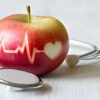Bookmark this page for diet advice, sample diet-plans and food menus for a range of specific health conditions, such as heart disease, candida, diverticular disease, gluten intolerance, lactose intolerance, IBS, fibromyalgia and others. Although diet is not typically the main cause of these disorders, symptoms may invariably be improved by eating the correct foods and avoiding those food types that aggravate the condition.
Candida
Candida is a yeast infestation. The species most often involved is Candida albicans, and the infection is known as candidiasis. The purpose of a candida reduction diet is to eliminate those foods that “feed” the yeast infestation, by rigid adherence to a “restricted foods list.” The duration of the diet is typically determined by the history and severity of the symptoms and overall health.
Guide to Candida Diet
Foods to Eliminate on Candida Diet Plan
Foods to Eat on Candida Diet
Diverticular Disease
A low-fiber diet is considered to be the main cause of diverticular problems. First diagnosed in the United States in the early 1900s, and now common throughout developed countries, the emergence of diverticular disease coincided with the introduction of low-fiber processed foods (eg. branless refined flour).
Diverticulosis and Diverticulitis
Diet Treatment for Diverticulitis
Fiber Foods for Diverticulosis
Advice About Increasing Fiber Intake
Celiac Disease (Gluten Intolerance)
At present, the only treatment for celiac disease is to follow a gluten-free diet, and eliminate all foods that contain wheat, rye, barley and oats. Most celiac patients have to avoid all traces of gluten, while some celiacs can get away with eating a small amount occasionally. Also, some patients do not have to eliminate oats from their diet. On the other hand, some celiac sufferers have an acute reaction (known as celiac shock) to even the smallest amount of gluten.
Celiac Disease & Gluten-Free Diet
Advice About Diet for Celiacs
Details of Gluten-Free Diet
Vegetables and Fruits for Celiacs
Dairy Foods, Meats and Protein
Fats, Sweets, Condiments, and Beverages
Gluten in Processed Foods
Gluten-Free Diet Menu
Diet And Heart Disease
High blood pressure (hypertension), raised cholesterol and clogged arteries (atherosclerosis) are strongly associated with heart attacks and stroke. Treatment for both conditions involves dietary change, to reduce total fat-intake, saturated fats and trans-fats, as well as sodium intake, and to increase consumption of fresh fruits and vegetables. For more information see:
Atherosclerosis Diet Advice
Diet To Reduce Cholesterol
Diet For High Blood Pressure
Lactase Deficiency
People who suffer from lactose intolerance are unable to digest lactose, which is the principal sugar in milk and milk products. This digestive incapacity is caused by a lack of the digestive enzyme lactase.There is no “special treatment” for lactose intolerance. The only way to control symptoms is by diet modification.
Lactose Intolerance & Lactase Deficiency
Lactose-Free Eating Plan
Sources of Calcium For Lactose Intolerant
Lactose in Processed Foods
Lactose-Free Diet Menu
List of Lactose-Free Foods
Irritable Bowel Disease (IBS)
Treatment for IBS is typically conditional upon a patient’s age, general health and medical history, severity of symptoms, tolerance and suitability for medications. Treatment may include diet modification, such as switching to a high fiber diet, the use of fiber supplements, laxatives, and other medications to relieve symptoms.
Guide to Irritable Bowel Syndrome
Diet Treatment For Irritable Bowel
Reduce Insoluble Fiber Intake
Soluble Fiber Supplements for IBS
Diet Modification for IBS
More Diet Advice For IBS Patients
Exercise is Important in IBS Diet Management
IBS Diet Menu
See also:
Healthy Diet and Eating Advice
GI Diet Method
Healthy Diets and Eating Plans For Women
See also: Why We Gain Fat? An Explanation Of Body Fat (Adipose Tissue)
An explanation of how surplus food calories is converted into body fat for energy storage.
Fibromyalgia Syndrome
There is no specific Fibromyalgia Diet for this musculoskeletal/rheumatic condition, but please check out our Dietary Guidelines For Fibromyalgia Symptoms. Note also that Aspartame and MSG May Affect Fibromyalgia. Some experts believe that an Elimination Diet may help this disorder, or a Diet Plan To Reduce Rheumatism.
A Healthy Digestive System
Our food digestion system (mouth, esophagus, stomach, small intestine, large intestine) helps us to convert and absorb energy and nutrients from food. Carbohydrate, fats and protein are each digested differently within the upper gastrointestinal tract, but surplus calories from these three micronutrients are ALL converted to body fat. Malabsorption, bad dietary habits, viral or bacteriological infections and food toxins can cause a range of digestive disorders including: Indigestion, Nonulcer Dyspepsia, Constipation, Diarrhea, Gastroenteritis, and other digestion problems, or even food poisoning.
Water And Diet
Fluids are essential to prevent dehydration and maintain good health. The body regulates the correct fluid balance through the use of electrolytes like potassium and sodium. Occasionally our fluid balance is upset, by hot weather, excessive sodium intake or illness, and water retention and edema may occur. The treatment for water retention depends on its causes. Reducing our intake of sodium intake is usually an important part of any diet to reduce water retention.
Special Diet Advice For Other Health Conditions
Anemia
Boils and Spots
Diarrhea Diet Advice
Please Note: The above advice about diet and health is offered for general educational purposes only. If you suffer from specific symptoms, of any of the above conditions, please consult your physician for advice.











